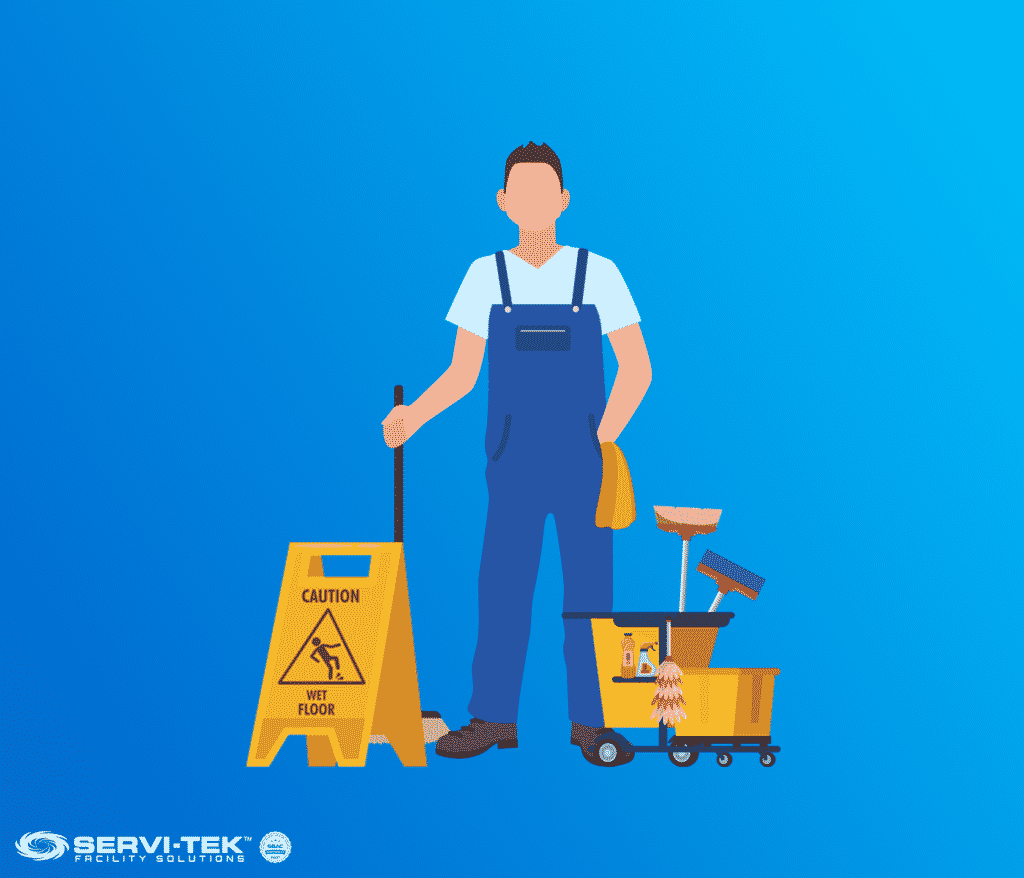
There is a general misconception when it comes to the field of commercial cleaning services: many find janitorial services and facility maintenance services to be the same.
But that’s not the case. You must know the differences so you can choose what’s best for your facility.
In this easy-to-read article, we will go through the important information, facts, and differences between the two, and all you need to know when looking to employ one of the two services.
What is Janitorial Cleaning?
The meaning of janitorial cleaning services is defined as involving types of activities including cleaning, fixing, and maintaining a physical space.
According to the Occupational Outlook Handbook, a janitor’s role is that of a building cleaner that maintains order. Some of the most closely related occupations include grounds maintenance and pest control.
Generally, the janitorial work environment involves performing indoor work like maintaining clean restrooms, or outdoor work.
Janitorial indoor tasks include trash removal, scrubbing counters, surface cleaning, dusting, removing debris from hallways, and deep carpet cleaning.
A janitor can also be responsible for bathrooms such as stocking tissue or cleaning urinals, toilets, sinks, and more.
Other examples include maintaining clean offices, vacuuming, buffing, removing dishes from breakrooms, wiping down machinery, caring for lawns, and snow removal.
They might be employed by a third-party commercial cleaning company, a property management company, or the business itself.
These professionals work in environments including schools, healthcare, or industrial settings and often must wear personal protective equipment (PPE).
What is Facility Maintenance?

Even in today’s virtual, remote, and real-time digital environment, many businesses maintain physical locations that require cleaning, maintenance, and disinfection services.
This has particular relevance for assets that are integral to the business. Facility maintenance tasks can vary considerably in complexity from plumbing or electrical to trimming shrubs or changing light bulbs.
Facility maintenance is often performed in response to a malfunction or problem, such as a machine that breaks down. It also may be routine or preventative services intended to keep the machinery operating efficiently or ensure performance is optimized.
Poorly performed regular maintenance or the lack of it often contributes to financial losses.
For example, failing to change the filter on a piece of capital equipment might cause the machine to become overheated. In this scenario, a machine with an anticipated service life of 10 years might need replacing several years earlier. Manufacturer or distributor warranties become void if the business neglects to follow the proper service and general maintenance schedule.
The Role of The Facility Manager
The International Facility Management Association (IFMA) outlines how today’s facility managers must have skills in various disciplines.
The profession must strive to protect occupant safety and well-being, operational efficiency, system functionality, and comfort. A highly effective facility manager interacts with people, understands the organization’s goals, and is increasingly using technology to improve operations.
Facility management professionals might have various titles including facility administrator, facility supervisor, facility director, building system specialist, facilities engineering manager, etc.
The role typically involves responsibility for assets of significant value such as buildings, equipment, management of personnel, inventory, and more. To perform this job, one must have excellent organizational skills and a certain degree of technical aptitudes.
A facility manager has responsibility for HVAC, plumbing, and electrical equipment maintenance, repairs, installation, or repair. The individual might have also temporary assignments to assist and manage building renovations to ensure reasonably high quality.
A facility manager generally has a budget and goals based on productivity, environmental concerns, compliance, and security.
The Role of the Janitorially Trained Professional

It is an occupation that often is overlooked. However, building occupants will immediately notice if they were absent, and the effect wouldn’t be so pleasant.
The occupation is also commonly referred to as a custodian. The role is best summarized as having responsibility for the cleaning and safety of a workplace setting.
Janitors often have a high school diploma and may or may not have formal job training.
Some of the most common include the following:
- Emptying trash cans, cleaning the inside as needed, and replacing the liners.
- Restocking restroom supplies such as soap, tissue, and paper towels.
- Cleaning restroom counters, mirrors, toilets, sinks, floors, and more.
- Entryway areas maintenance and dust removal.
- Locking and unlocking the building each day.
- Exterior tasks such as trash removal, snow removal, raking leaves, and possibly mowing lawns and removing weeds.
Janitors need training on how to operate the equipment needed to complete the work. Examples include floor buffing devices, carpet shampoo machines, operating a snowplow, and using a pressure or power washer.
There are plenty of other recommended strengths and attributes that janitors must-have.
They typically must have some degree of physical strength that this job commonly requires. Janitors should have reasonably good communication skills for interacting with other departments and some basic reading competency.
Among the critical core competencies are having some degree of mechanical skill and a basic understanding of the equipment within the facility.
Why It’s Important to Know the Difference
The role of a janitor and the members of the facility maintenance team are commonly mistaken for each other. This confusion makes sense, based on how each role performs similar functions that have some overlap.
A facilities maintenance professional typically has a superior level of mechanical aptitude for working with systems and equipment.
In many cases, a janitor is largely limited to cleaning, with minimal responsibility for troubleshooting like the facility maintenance professional would. Some of the tasks that a janitor is much less likely to perform include the maintenance of capital equipment.
A janitor is less likely to make repairs to plumbing, electrical, HVAC, and similar types of systems.
Who Does What and When?
The roles and schedules of those working in these positions are different based on the individual facility.
They may or may not be direct employees of the business or property management company, or be working for a third party. The schedules vary based on whether the workplace operates during traditional business hours or around the clock.
Facility Maintenance is a Broader Term
In general, the role of a facility maintenance professional involves a wider scope of responsibilities than the janitor.
Although not qualified to perform the work of an electrician, a maintenance professional monitors maintain, and assists with electrical systems. For example, electrical outlets, switches, fixtures, and other parts of the system.
A facility’s HVAC system is among the most critical and the maintenance department works with it regularly. Common examples include managing system controls, cleaning and maintaining coil units, and basic repair or replacement of various components.
Another example is the facility maintenance professional’s involvement with the plumbing system. They might repair leaking faucets, clear line obstructions, and assist a plumber as needed.
Janitorial Encompasses All the Tasks of Facility Maintenance, But More
The responsibilities of a janitorial professional may be rather limited to cleaning. However, many more now seek extensive training.
A janitorial professional is more likely to handle maintenance tasks rather than the other way around. For example, many commercial janitorial services now offer power washing, sterilization of furniture and upholstery, and will perform basic repairs.
The People in Charge Are Called by Different Names
As with the majority of departments in a commercial environment, a hierarchy usually exists such as with a supervisor, manager, etc.
Some of the examples include custodial manager, building and grounds supervisor, maintenance manager, property service, and maintenance coordinator.
Specializations
Certain specialties exist within the field of facility management based on the structure of the business and the type of operational environment.
One such area includes the supervision and management of personnel. For example, a facility manager or director can be responsible for motivating staff, team building, and overseeing the staffing budget.
The management of the janitorial and maintenance staff involves communications, scheduling, and various administrative tasks.
Environmental sustainability is one area of specialization that is continuing to evolve as facilities seek to adopt more eco-friendly practices. Common goals include minimizing indoor air pollution, reducing the consumption of energy, and identifying opportunities to recycle and reuse.
Facility maintenance professionals generally must specialize and maintain a working knowledge of the building’s heating, ventilation, and air conditioning (HVAC) system.
The HVAC system requires preventative maintenance, monitoring, component replacement, and other aspects that must be managed. Proper airflow must be maintained, water properly distributed, and routine inspections are performed on parts including fans, coils, and pumps.
Facility maintenance managers have traditionally earned a high school diploma, achieved certifications in various specialties, and now increasingly have college-level educations.
Earning a 2 or 4-year degree is strongly encouraged for those seeking to elevate their career into higher management roles. Examples might include those pursuing positions as directors of operations, environmental services, and other areas.
Experienced Provider of Janitorial and Facility Maintenance Solutions
In the United States, Servi-Tek Facility Solutions is proudly among the industry leaders when it comes to the field of commercial janitorial, maintenance, and engineering services.
Much of our success and growth over the last 15 years is attributed to maintaining a professional staff and leveraging technology.
Especially in a world recovering from the long-term effect of COVID-19, we encourage you to contact us today and find out how we can become a great asset to your facility.




